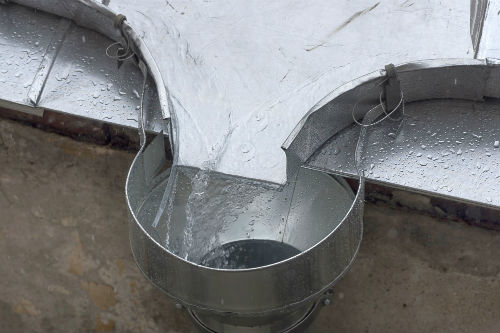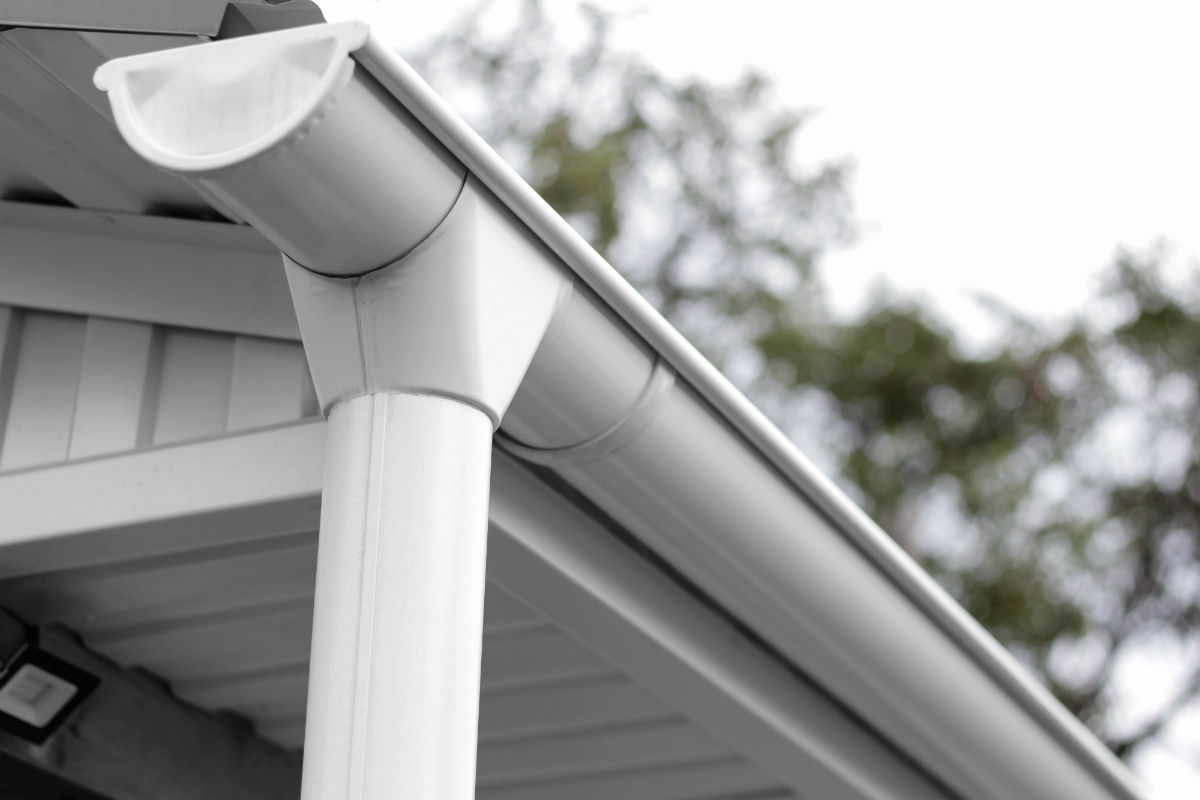Rain gutters serve two primary purposes.
Number one, they protect the home or commercial building (as well as the property it’s built on) from water damage caused by pooling.
And number two, they provide an aesthetic that adds to the attractiveness of the structure.
Without an effective rainfall management system, a lot of damage can be caused to the structure, its foundation, and the surrounding land. If you were to strip away the gutters and downspouts on a typical, single-family home, it would only take a single season to start noticing the derogatory effects.
Water erosion would slowly eat away at the ground below the roof edges. Window wells or ground-level windows would become saturated with water and would probably begin the process of rotting.
Vinyl or wood siding might also become compromised as the amount of water exposed to it would be much higher than what the material is manufactured to withstand. And, it’s probable that water would start to creep into the foundation of the building, beginning the process of causing incredibly expensive damages over time.
The Aluminum vs. Vinyl Grudge Match
Granting the importance of rain gutters, we often get the question, “Which is better? Aluminum or plastic?”. This is a great question to ask, as manufacturers are often touting the benefits of both without explaining the drawbacks.
So, let’s explore the pros and cons of both plastic and aluminum rain gutters.
Plastic
When we talk about plastic rain management hardware, we often refer to gutters and downspouts that are composed using vinyl (also termed PVC), the same material used for making tarps, upholstered furniture, and more.
Vinyl gutters offer the following benefits:
- Lower cost. For the most part, PVC gutters are cheap in comparison with their aluminum counterparts.
- Simple DIY installation. Many PVC gutter suppliers offer all-in-one kits that provide homeowners with everything they need to install the equipment themselves using simple hand tools.
- Easy to replace or repair sections. If and when the time comes, fixing a broken PVC gutter is a fairly straightforward process.
Vinyl gutters do have some cons, too. They include:
- Seamed construction. It’s virtually impossible to install a seamless vinyl gutter system on a home or commercial building. So, there will need to be seams every few feet, and these seams can develop leaks over time.
- Reduced durability compared with aluminum. PVC can become weakened after long-term exposure to direct sunlight and wide temperature swings.
- Less tolerance for snow and ice burdens. Here in Colorado, snow and ice can build up on rooftops, creating a heavy load for gutters to withstand. Pound for pound, vinyl gutters don’t hold up as well under this weight.
Aluminum
Aluminum gutters are much more popular than vinyl gutters for many reasons. Some of the most cited advantages are:

- Fewer seams. Many aluminum gutter systems can even be completely seamless, as the pre-rolled aluminum sections are extruded on-site to meet the unique dimensional needs of the roof edge. Fewer seams result in fewer leaks over time.
- Increased strength and durability. Aluminum tends to adapt better to environmental factors compared with vinyl. And, aluminum will bend instead of break, a feature that results in a longer lifespan season after season.
- More color options. Generally speaking, most aluminum gutters can be custom colored to suit the building they’re installed onto. This isn’t as common with PVC gutters.
As beneficial as aluminum gutters can be, they’re not without their disadvantages, which include:
- Slightly higher cost. You’ll pay a bit more for aluminum gutters, but not by a factor of more than 10%-20% in most cases.
- More challenging to clean. PVC tends to have a smoother, less abraded surface. Aluminum gutters can have sharp edges which can make gutter cleaning tasks slightly more difficult.
The Final Verdict
Both vinyl and aluminum gutters and downspouts offer unique pros and cons for Colorado home and business owners. For those with a lower budget, vinyl can be a great choice. For added protection and a longer lifespan, aluminum is the clear choice.
PVC and aluminum are both recyclable, and they’re both great options to consider, but it’s not always obvious which one is best. That’s where the value of a professional roofing contractor like A-to-Z Roofing & Exteriors comes in.
We know gutters and downspouts, and we know how to help you choose the right product to meet your unique needs.
To start a conversation about upgrading or replacing your existing gutters and downspouts, contact us today.

